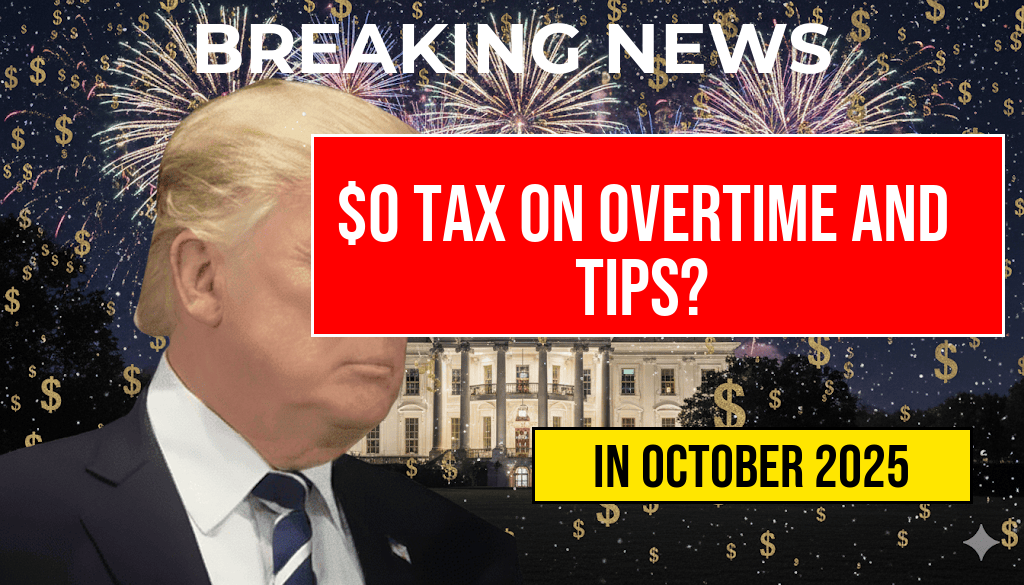A proposed early refund initiative in the U.S. is drawing attention as it promises to eliminate taxes on overtime pay and tips, potentially benefiting millions of workers. This plan, aimed at alleviating financial burdens for employees in various sectors, especially in hospitality and service industries, seeks to provide a financial cushion amid rising living costs. Advocates argue that it will incentivize both employees and employers to embrace fair compensation practices. With the proposal still under discussion, many are eager to understand who stands to gain from these tax relief measures and how they could reshape the workforce landscape.
Understanding the Proposal
The early refund proposal, which is being considered by lawmakers, is designed to offer tax relief specifically for overtime wages and tips. This initiative could significantly change the tax obligations for workers who regularly receive tips, such as waitstaff, bartenders, and taxi drivers, as well as those who often work overtime hours. By categorizing these earnings as tax-exempt, the proposal aims to put more money directly into the pockets of workers, thereby boosting their disposable income.
Who Will Benefit?
The primary beneficiaries of this proposed tax relief are expected to be workers in sectors where tips and overtime are common. Here’s a breakdown of who stands to gain the most:
- Service Industry Workers: Employees in restaurants, bars, and hotels often rely on tips as a substantial part of their income. The elimination of taxes on these earnings would provide a much-needed financial boost.
- Healthcare Workers: Many healthcare professionals, especially those working overtime during critical periods, would benefit from reduced tax burdens on their additional earnings.
- Gig Economy Workers: With the rise of gig economy jobs, workers who earn through various service platforms may also see a significant impact, as many of them work irregular hours and rely on tips.
Potential Economic Impact
Proponents of the proposal argue that removing taxes on overtime and tips could have a ripple effect on the economy. Here are some anticipated outcomes:
- Increased consumer spending as workers have more disposable income.
- Enhanced job satisfaction and retention in industries that typically struggle with high turnover rates.
- A boost to local businesses as increased spending could lead to higher sales and revenue.
Concerns and Considerations
While the proposal garners support from many worker advocacy groups, it also raises questions about potential drawbacks. Critics argue that eliminating taxes on these forms of income could lead to:
- Loss of Revenue: Government entities may face budget shortfalls, impacting public services reliant on tax income.
- Abuse of the System: There are concerns that some employers may take advantage of the system, misclassifying workers to avoid tax liabilities.
Implementation Challenges
Implementing such a significant change in tax policy could encounter several hurdles. Lawmakers will need to carefully consider the logistics of tracking and enforcing the new rules. Additionally, it will be essential to ensure that the benefits reach the intended recipients without creating loopholes that could be exploited.
Looking Ahead
As discussions around the early refund proposal continue, stakeholders from various sectors are keeping a close eye on developments. Economic experts and labor advocates are weighing in with their analyses, highlighting the need for balanced approaches that support workers while also maintaining fiscal responsibility. The outcome of this proposal could redefine the financial landscape for many workers across the nation.
Further Reading
For more information on tax policies and their impact on workers, you can visit:
Frequently Asked Questions
What is the Early Refund Proposal regarding overtime and tips?
The Early Refund Proposal aims to eliminate taxes on overtime and tips, allowing workers to receive more of their hard-earned money without the burden of taxation.
Who will benefit from the proposed tax changes on overtime and tips?
Workers in industries that rely heavily on overtime and tips, such as hospitality and service sectors, stand to gain the most from this proposal as it directly impacts their take-home pay.
How does the proposal affect workers’ overall income?
By removing taxes on overtime and tips, workers could see a significant increase in their overall income, allowing them to retain more of their earnings for personal expenses and savings.
Are there any potential downsides to the Early Refund Proposal?
While the proposal offers immediate benefits, some experts worry it could lead to reduced government revenue, potentially affecting public services and infrastructure funding in the long run.
When is the Early Refund Proposal expected to take effect?
The timeline for the implementation of the Early Refund Proposal has not been clearly defined, but stakeholders are advocating for swift action to support workers as soon as possible.








